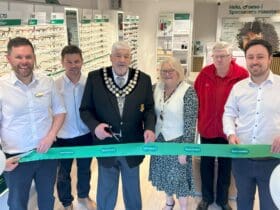Pregnant smokers are being recruited to a research trial that uses nicotine replacement in different ways to help them kick the habit.
SNAP-3 is open to mums-to-be who are less than 25 weeks pregnant and who smoke five or more cigarettes a day.
It is a national study, conducted by the University of Nottingham, and led in Swansea Bay by the health board’s specialist research midwives.
Nicotine Replacement Therapy, NRT, such as nicotine patches used with behavioural support, has been shown to be effective in helping people to quit smoking. But there is less evidence of it being effective in pregnancy.
Pregnant women who agree to take part in SNAP-3 are offered nicotine patches along with new behavioural support intervention, to help prepare them to use the replacement therapy more effectively.
The study is designed to run alongside existing smoking cessation services – such as Help Me Quit in Swansea Bay, which will be launching a maternity-specific service later this spring.
Nationally, the study wants to recruit 1,430 patients. Swansea Bay began recruiting its first mums-to-be towards the end of last year.
Research midwife Joelle Morgan said: “We are hoping to identify women at booking or at their dating scan so that we can support them early on in the pregnancy.
“The recruitment process is very straightforward. It’s usually all over the telephone. It takes about 20 minutes, and they get emailed a link to a consent form to complete on their device.
“They are asked a couple of questions about their smoking behaviours and habits. After that they are randomly allocated either to the usual care provided by Help Me Quit or the SNAP-3 study intervention, which is a slightly different way of using the nicotine replacement therapy.
“That intervention is anywhere between one and four weeks depending on what the woman feels she needs. Their care is taken over by Help Me Quit from that point onwards.”
There are numerous benefits to stopping smoking during pregnancy, such as reducing the risk of complications or low birth weight, while increasing the chance of a healthier pregnancy and a healthier baby.
Babies are less likely to be born too early, with all the breathing, feeding and health problems that go with premature birth.
It can also help the baby later in life. Children whose parents smoke are more likely to develop asthma and other serious illnesses that may need hospital treatment.
Recruitment to the trial started locally in October, with around a dozen women agreeing to take part in the first few months.
Joelle said reaction varied considerably. Some women were so well motivated to quit that they had already stopped smoking before the research midwives spoke to them. Others wanted no input at all.
Research midwife Sharon Jones said: “That just demonstrates how difficult it is, even though there is support available
“It’s very complex. Women will report different factors and lifestyle issues that feed into their habit. They recognise a lot of them, but how they break those habits is very difficult.
“There’s the standard Help Me Quit support available but engagement with that has not been as good as we would like.
“And so it’s really finding interventions and strategies that are more effective and will hopefully achieve the goal of quitting and the health benefits that come with it.”
The Swansea Bay midwives work in collaboration with Health and Care Research Wales which, supported by Welsh Government, promotes health and social care research in Wales to improve and save lives.
As well as funding research and development within NHS organisations across Wales, it provides training and promotes research activity and the engagement of health care professionals and participants.
Susan O’Rourke, service development manager for smoking cessation and self-management programmes, said Help Me Quit was open to all pregnant women, regardless of whether they took part in SNAP-3.
“We are also currently recruiting for Help Me Quit maternity stop smoking advisors, with the new service being introduced within the maternity department from the end of April,” she said.
“The advisors will work closely with midwives and maternity care assistants to raise awareness of the maternity smoking cessation service and its referral pathways and provide advice and support on discussing cessation with pregnant smokers.”
Swansea Bay’s specialist public health midwife, Emma Richards, described the SNAP-3 study as a great collaboration between the research midwives and Help Me Quit.
“We will be moving this forward with the development of the maternity smoking cessation service,” she added.









Leave a Reply
View Comments